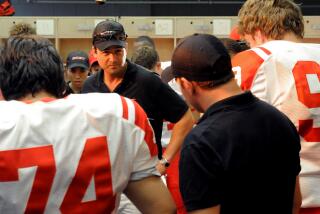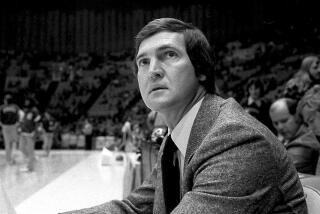Looking beyond X’s, O’s
IN “Glory Road,” which opens Friday, Josh Lucas plays the legendary NCAA basketball coach Don Haskins, who took his underdog team, the Texas Western Miners, to championship glory 40 years ago.
What makes Haskins’ accomplishment historically significant is that his opening lineup in the title game was composed entirely of African American players.
Though Lucas, 34, never had a sports mentor such as Haskins, there was a high school coach who changed his life.
“There was a debate coach who was so storied because he had won 13 state championships in a row,” says Lucas, best known for his roles in “Sweet Home Alabama,” “The Hulk” and “A Beautiful Mind.” “He was an extremely complex, tough, psychological, manipulative, powerful man.”
It was this coach, at a public school in a small town south of Seattle, who first saw the actor lurking inside Lucas. “The coach would take you in and basically talk to you for a period of time to determine what position [on the debate team] you should be in.” But during this sizing up, the coach didn’t think Lucas was “bright enough” to debate subjects. Instead, the coach suggested that he try his hand at dramatic interpretation, in which students would perform 10 minutes from a play.
“There are no costumes,” says Lucas, relaxing in the frontyard of his rustic Hollywood Hills home. “It is by using voice and face. It is really interesting training.”
Shortly after Lucas was selected for a dramatic interpretation, he said, he realized: “This is what I will do for my life.”
Lucas, a tall, blue-eyed actor who resembles a young Paul Newman, says there were tremendous differences in personality between his debate instructor and Haskins. “Don is a powerfully masculine personality,” he says. “Sports psychology lacks neurosis.... There is a power in the egos that is unwavering in sports.”
THOUGH the role of Haskins seems to fit Lucas like a glove -- he even put on 40 pounds to play the role -- it was actually Ben Affleck who had been attached to “Glory Road.” But he dropped out within a month before production began in the early fall of 2004 because of scheduling problems.
James Gartner, an accomplished commercial director who makes his feature debut with “Glory Road,” says he knew Lucas mostly from “A Beautiful Mind,” in which the actor played a fellow student of mathematical genius John Nash.
“What I am locked into when I am casting is just how truthful an actor is,” Gartner says. “I looked at a lot of his work and thought he was an honest actor -- someone who is genuine. You didn’t see his ‘work.’ He just becomes that character.”
With less than a month before production was set to begin, Lucas became obsessed with researching Haskins.
“I found out quite quickly how much people respected and loved him -- on a grand scale,” Lucas says. “I literally had legendary basketball personalities around me, one of them who is now coach at USC, Tim Floyd [who worked under Haskins], every single day watching every single take and talking to me after every single take.”
Lucas also spent a lot of time with Haskins, but their relationship was more playful.
“He and I would go out in his big truck and drink tequila and tell stories,” Lucas says. “What I found so interesting about him is that he has one of the most complex, powerful and even dangerous intensities on the court. His players hated him” because he drove them so hard.
But their mothers loved him because Haskins brought these young African American players from across the country and gave them a shot at higher education and the opportunity to excel at their sport.
“I realized I had a responsibility to figure out how to play not just the intensity of him but what was beloved about him,” Lucas says. “The day they finished playing for him, they were lifelong friends.”
Gartner found Lucas an easy and willing collaborator, not just “an ego who kind of kept himself at a distance.”
“He was so encouraging of me, just saying, ‘Let’s make mistakes; let’s play with this,’ ” Gartner adds. “I would often call it a ‘bonus round.’ Almost always something special comes out of bonus rounds.”
Lucas deliberately didn’t fraternize with the actors who played members of the basketball squad.
“Haskins, like me, wasn’t that different in age from his players at that point. He has to command a certain discipline -- be a father-type figure. I wish, I almost yearned, to be able to be a bit more me. I spent a lot of time in their faces and being difficult at times.”
“Josh was the coach on and off camera,” Gartner says, echoing Lucas. “I think they looked at him too in a leadership kind of position. He kept that going outside of the camera’s range.”
Over the course of his career, the actor said he has encountered three “difficult personalties” who challenged and pushed him as an actor: Sean Penn, Russell Crowe and the late George C. Scott.
“All of them have been forces in my understanding of how to do this job,” he says. “They commit so totally to the character and the process.”
But it was Scott who perhaps made the biggest impression. Lucas met him when the two made a 1994 “In the Heat of the Night” TV movie, “A Matter of Justice.”
“I saw him drop someone to their knees with his voice from 15 yards,” he said. “He destroyed everyone else around him.”
But not Lucas. The irascible Oscar winner saw something in Lucas and immediately took him under his wing.
“It was incredible,” Lucas recalls. “He was the person who said to me, ‘Get out of L.A. and go to New York and do theater.’ I did, immediately.”
More to Read
Go beyond the scoreboard
Get the latest on L.A.'s teams in the daily Sports Report newsletter.
You may occasionally receive promotional content from the Los Angeles Times.











